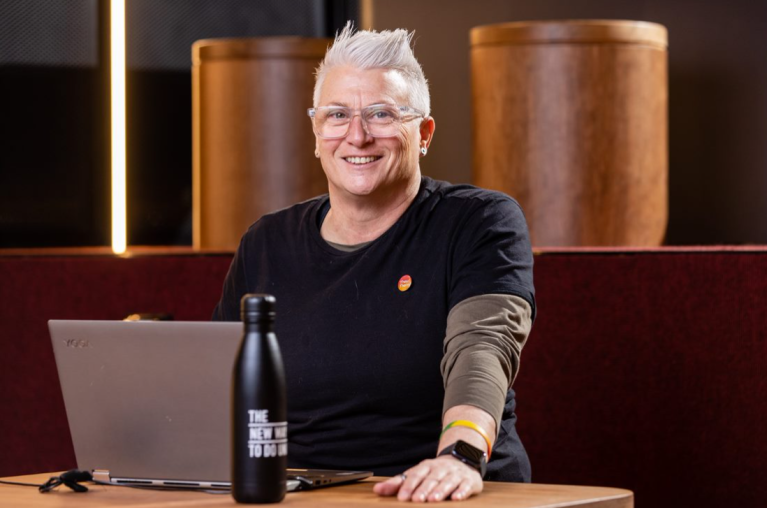Supporting LGBTQIA+ communities: A Q&A with Joey Vegas
Opening a Melbourne hair salon in the 90s, Joey Vegas wanted to create an environment where everyone was able to express themselves.
Challenging the status quo of mainstream hairdressing at the time, there were no restrictions on style, gender, or fashion.
In the decades following, Joey has seen clients in the salon at exciting, happy times; and heard about sadness, alienation, and distressing experiences too.
Seeking a break from the physical demands of the salon floor, Joey started a course to qualify as a hairdressing educator. While completing that course Joey started thinking seriously about studies in law and psychology.
Now in their third year of the Bachelor of Laws/ Bachelor of Psychological Studies at Victoria University, Joey is looking forward to making a difference for the LGBTQIA+ community.

Q&A with Joey Vegas
What was it like to study again after 30 years in hairdressing?
I started a Certificate IV Workplace Training and Assessment course to become a hairdressing educator. While doing that course, I began exploring other areas of study.
After some time, I had decided I wanted to do the Bachelor of Laws/ Bachelor of Psychological Studies. I completed a Diploma of Business first, as a diploma-level qualification was required for entry.
When I was accepted into the double degree, I was blown away. It was like: now the study begins, I have made it to the start line.
I’m now in my third year and I am thoroughly enjoying it.
Looking back at your career before returning to study, what did you enjoy about hairdressing?
The first salon I had blew the industry apart. I wasn’t satisfied with the mainstream hairdressing that was available in the 80s and 90s, and I wanted make alternative styles available professionally, where you could get flawless blue hair or an extremely short haircut without being told it was a ‘boys cut’.
My salon, Vegas Hair, was an exciting place to be. There were no restrictions on gender, style or fashion - you could express yourself. We didn’t charge based on gender, it was the same prices were for everyone. Vegas Hair was a meeting place for the LGBTQIA+ community and there was always something happening. There were rainbow flags hanging at the front door and side windows, it took so long to find those – we didn’t have the internet back then!
Don’t get me wrong, I still love hairdressing. It's just too exhausting to be on the salon floor every day!
How has your life and work experience prepared you for this new career path?
I feel like everything I have done in my life has brought me to this place.
As a hairdresser, you are involved in people’s lives.
Working with people one-on-one, young rainbow people in the chair telling me their struggles or problems at work: getting victimised by their boss because they’re gay or lesbian, or losing their job because of a haircut that didn't make the boss happy. I'd say “they can’t do that to you.”
Even older clients with parents overseas, when they returned home their parents would say “you don’t look like my daughter.”
People surprised me with awkward comments or questions, and I would think ‘why would people say that or why would a person behave like that?’
There was this wall I’d keep hitting. I’d reached a plateau in my understanding, and I wanted to learn more. Thankfully psychology provides these answers.
How do law and psychology interrelate and what do see changing in both areas?
Law and psychology work together beautifully. Psychology is intriguing because the mind still has territories unknown. So does the law.
There was once a time when the study of the mind was conducted unethically in asylums. We’re at a stage where psychology is an accepted practice for positive mental health.
The law is structured, but malleable in its form, and there is always room for interpretation. Society changes and new laws are created, for example for drones, cyber security, and the emergence of artificial intelligence.
In Australia, we have governance and policies for these areas but are yet to have legislation introduced that covers the wide-ranging impact of these changes in society.
What would you like to see change in the law?
Maybe I don’t agree so much with the punitive system. I believe people learn from encouragement.
Hopefully that can change in the future alongside contemporary thought about learning and re-learning.
It would be great if people got paid to go to uni. Not everybody wants to work all their life, and not everybody wants to study all their life. It would be good to be able to do both.
How do you see yourself applying your knowledge in law and psychology?
I’m interested in human behaviour. Say I’m defending somebody, I am interested in understanding: what have they been through? Is there trauma in their life?
It is all about trauma, boundaries, and learned behaviour.
Do you know what areas of law you want to work in when you finish your degree?
I hope to be working with the LGBTQIA+ community, who I think could do with a lot more lawyers and counsellors.
I think LGBTIQA+ people would appreciate a Transgender guy representing them. Having someone who understands them, their needs, their wants and human right to be accepted in society and represented professionally. So they have a leg to stand on, even if they have done the wrong thing.
Instead of rage being used in rallies, we could spread the message about how to change laws at peaceful protests.
For example, during the Victoria Pride celebrations, JoyFM were broadcasted live and someone jumped on and announced reforms achieved in the past 6-8 years: same-sex marriage, eliminating gay conversion therapy and removal of sex descriptors previously required on a drivers licence.
Maybe one day I'll speak on JoyFM about legal matters relating to LGBTQIA+ rights and assist all Queers to stand up for themselves!